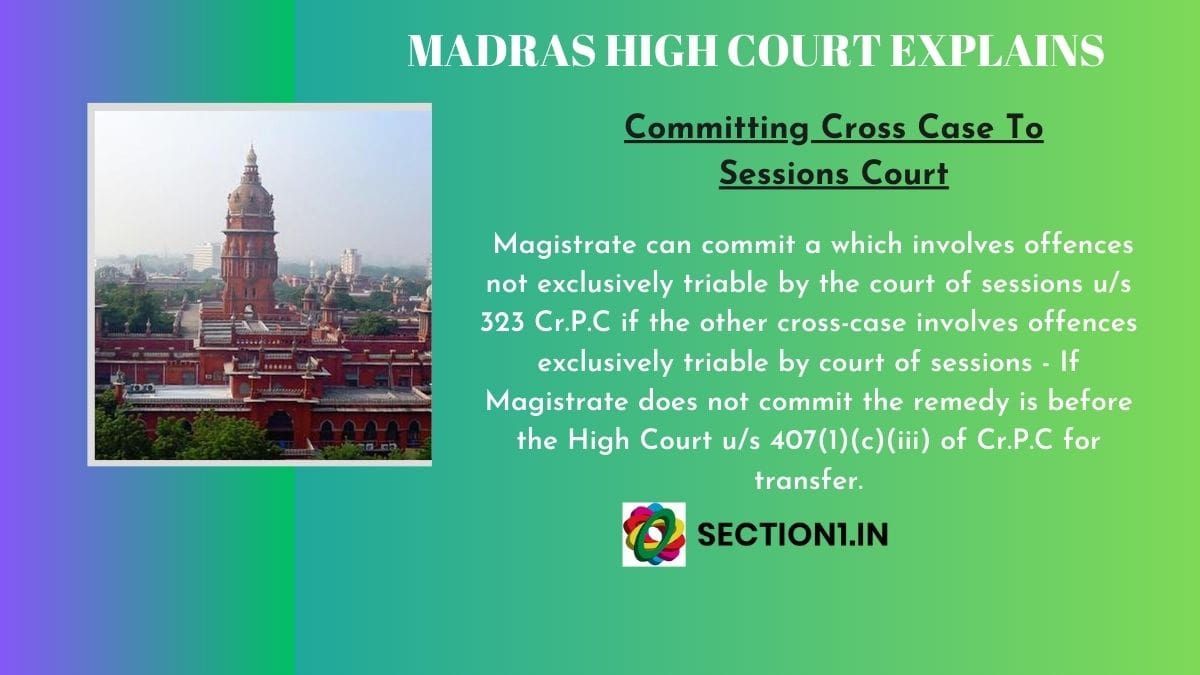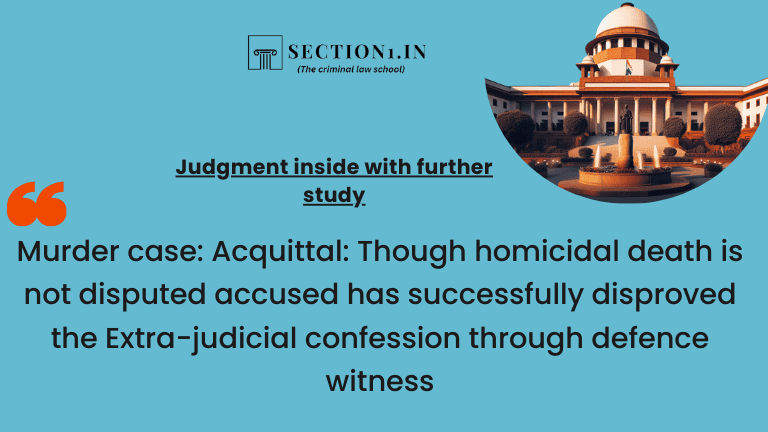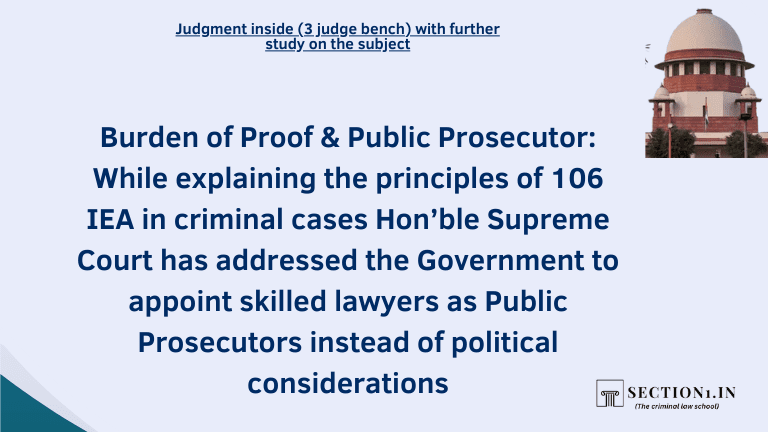Committing the cross-case where offence triable by Magistrate
Let us, at the first, deal with the issue as to whether it would be lawful for a Magistrate to commit a case which involves offences not exclusively triable by the court of session. It is needless to point out that if any one or more of the offences involved in a case is / are triable exclusively by the Court of Session, then, it is mandatory for the Magistrate to commit the case under Section 209 of Cr.P.C. Section 209 of Cr.P.C. does not empower the Magistrate to commit a case which does not involve offences exclusively triable by the court of session.
Section 323 Cr.P.C
Next comes Section 323 of Cr.P.C. which is an extension of Section 209 of Cr.P.C. The said provision reads as follows:-
“323. Procedure when, after commencement of inquiry or trial, Magistrate finds case should be committed. If, in any inquiry into an offence or a trial before a Magistrate, it appears to him at any stage of the proceedings before signing judgement that the case is one which ought to be tried by the Court of Session, he shall commit it to that Court under the provisions hereinbefore contained and thereupon the provision of Chapter XVIII shall apply to the commitment so made.”
[Emphasis supplied]
The expression “it appears to him at any stage of the proceedings that the case is one which ought to be tried by the court of session” came to be considered by the Hon’ble Supreme Court in Sudhir and others Vs. State of Madhya Pradesh, AIR 2001 SC 826 . In that case, precisely, the question was when there are two cases in the nature of cases in counter [cross cases] whether it would be lawful for the Magistrate to commit the case which does not involve offences exclusively triable by the court of session.
Committing the cross-case u/s 323 Cr.P.C alsong with other case exclusively triable by sessions
A close reading of the above judgement would make it abundantly clear that under Section 323 of Cr.P.C., the counter case which involves offences not exclusively triable by the court of sessions should also be committed to the court of sessions for trial while committing the other case under Section 209 of Cr.P.C. In the instant case, the learned Magistrate ought to have committed the case in C.C.No.318 of 2012 when he committed the case in P.R.C. No.13 of 2013 [taken cognizance in S.C.No.71 of 2013 by the court of session]. It is also the law, for any reason, if the Magistrate fails to act suo motu, it is always open for any one of the parties including the investigating officer to approach the Magistrate with a plea under Section 323 of Cr.P.C. to commit the case to the court of session along with the other case involving offences exclusively triable by the court of session. If the Magistrate declines to commit so, the remedy for the aggrieved lies either before the Court of Session or High Court by way of revision.
xxx
Transfer could be done by High court only
A close reading of Section 408 of Cr.P.C. would go to show that it does not empower a Sessions Judge to direct a Magistrate to commit a case to the court of session. Such power is vested only with the High Court under Section 407 of Cr.P.C.
A cursory comparison of these two provisions of the Code would go to show that the High Court alone has been empowered under Section 407(1)(c)(iii) of Cr.P.C. to direct a Magistrate to commit any case whether it involves offence exclusively triable by the court of session or not to the court of session for trial. The Sessions Judge has neither power to direct a Magistrate to commit a case to the court of session nor does he has power to transfer a case from the Court of Magistrate to the Court of Session or Court of Assistant Sessions.
Without committing sessions court has no power to transfer the other cross-case to it
The next question is whether the learned Assistant Sessions Judge was legally right in trying the case without taking cognizance under Section 193 of Cr.P.C. Under Section 190 of Cr.P.C., only the Judicial Magistrate has been empowered to take cognizance of any offence. S.193 of Cr.P.C. states that a Court of Session may also take cognizance of an offence as a Court of Original Jurisdiction if the case has been committed to the said court. S.193 of Cr.P.C. came up for consideration before a Constitution Bench of the Hon’ble Supreme Court in Dharam Pal and Ors Vs. State of Haryana reported in (2014) 3 SCC 306 wherein the Hon’ble Supreme Court has set the controversies at rest by holding that the court of session may take cognizance of any offence as a court of original jurisdiction only upon the case being committed to the said court. In the instant case, since the case was not committed to the court of session, there was no cognizance taken at all by the court of session and instead, the learned Assistant Sessions Judge simply tried the case on transfer. This is, undoubtedly, an irregularity committed by the learned Assistant Sessions Judge. The learned Assistant Sessions Judge is required to follow the procedure for trial before a court of session under Chapter XVIII of Cr.P.C. He has got no power at all to try any case by following the procedure for trial of warrant- cases. But, in the instant case, unfortunately, the learned Assistant Sessions Judge tried the case by following the procedure for trial of warrant-cases. This is yet another irregularity.
Party
Venkatrayan vs. State by The Sub Inspector of Police, Mallasamudram Police Station, Namakkal District – Crl.O.P.No.30606 of 2014 and M.P.No.1 of 2014 – 20..11..2014.
https://www.mhc.tn.gov.in/judis/index.php/casestatus/viewpdf/207916
Further study
- Whether the sessions court can take second cognizance u/s 193Cr.P.C after the case was committed by the Magistrate who took cognizance u/s 190 Cr.P.C earlier?
- IN COMPLAINT CASES THE COMPLAINANT IS NOT BOUND TO EXAMINE ALL THE WITNESSES NAMED IN THE COMPLAINT.
- All about sanction and approver
- Section 193 Cr.P.C – Why a sessions court cannot take cognizance of an offence even though such an offence exclusively triable by that court? Explain the exceptions to same with illustrations?
- SECTION 294-b IPC – ABSENCE OF WORDS INVOLVE AROUSING SEXUAL THOUGHTS OR FEELINGS OR WORDS CANNOT ATTRACT OFFENCE U/S 294b IPC.







3 Comments
[…] Whether Magistrate can commit the cross-case triable by Magistrate offences to Sessions court under … […]
[…] Cognizance of offences by Magistrates. (1)Subject to the provisions of this Chapter, any Magistrate of the first class, and any […]
[…] the order of the sessions court order appellant challenged the same before High court and the same was […]